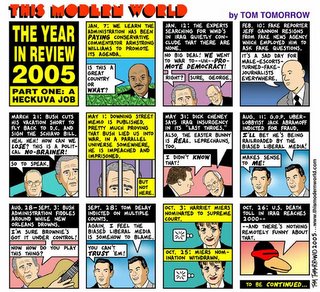Tuesday, December 20, 2005
Tuesday, December 13, 2005
Iraq: 1,000 Days of War
The Independent has extensive coverage marking the first 1,000 days of the way in Iraq today. Also Editor & Publisher has republished The Independent's by-the-numbers analysis as well part of Patrick Coburn's commentary.
To mark what it called the "1000 Days" of the Iraq war, the London daily The Independent offered extensive coverage today, featuring a by-the-numbers approach.
Here are some of their calculations:
$204.4 billion: The cost to the U.S of the war so far.
2,339: Allied troops killed
15,955: US troops wounded in action
98: U.K troops killed
30,000 : Estimated Iraqi civilian deaths
0: Number of WMDs found
66: Journalists killed in Iraq.
63: Journalists killed during Vietnam war
8: per cent of Iraqi children suffering acute malnutrition
53,470: Iraqi insurgents killed
67: per cent Iraqis who feel less secure because of occupation
$343: Average monthly salary for an Iraqi soldier. Average monthly salary for an American soldier in Iraq: $4,160.75
5: foreign civilians kidnapped per month
47: per cent Iraqis who never have enough electricity
20: casualties per month from unexploded mines
25-40: per cent Estimated unemployment rate, Nov 2005
251: Foreigners kidnapped
70: per cent of Iraqi's whose sewage system rarely works
183,000: British and American troops are still in action in Iraq.
13,000: from other nations
90: Daily attacks by insurgents in Nov '05. In Jun '03: 8
60-80: per cent Iraqis who are "strongly opposed" to presence of coalition troops
In an accompanying piece from Baghdad, the newspaper's Patrick Cockburn adds one more stat: A BBC poll yesterday showed that half of the Iraqis questioned say that Iraq needs a strong leader--while only 28 per cent cited democracy as a priority.
"Iraqis are cynical about their political leaders," Cockburn writes. "The election results are likely to show that the great majority of Iraqis will vote along ethnic or religious lines as Shia, Sunni or Kurds. The country is turning from a unitary state into a confederation.
"There is no sign yet of the thousand-day war ending. Every month up to a thousand fresh corpses arrive at the mortuary in Baghdad. A new Iraq is emerging but it is already drenched in blood."
Sunday, December 11, 2005
A Class Act
On Monday, I heard Richard Clark speak at the Commonweath Club of San Francisco. What a breath of fresh air. He does not treat the audience like morons. He describes complex situations in complex ways. For instance, on the news about "extraordinary rendition" - the practice of moving captives covertly from one country to another in order to keep them in custody - he pointed out that captives who are truly dangerous cannot just be released, like a trout. He was adamant that torture was absolutely not acceptable under any circumstances but that just releasing dangerous captives who cannot be successfully held in the country of capture was not really an option. I did not really agree, but his point was thoughtfully articulated.
At the end of the evening he was asked a question about John Stewart and the Daily show. The question was "what do you talk about when the mike is cut?" This was his answer.
I made a trip to South Africa when they still had apartheid. While there I made a point of visiting with Helen Suzman who for many years was the only member of parliament speaking out against apartheid. Suzman replied "I should thank you. Because, in this struggle, knowing that there are supporters like you keeps me from feeling that I am insane." So that is what I told John Stewart. When I am being attacked from all sides by members of the Bush administration, The Daily Show keeps me from feeling that my convictions are insane.
I like that.
Friday, December 02, 2005
Can Bush Differentiate Truth from Lies?
It seems that Time magazine reporter Michael Ware was actually on the ground imbedded with the troops during the battle that Bush claimed was led by Iraqi troops. This is from Anderson Cooper on CNN.
COOPER: You know this is not one of the shows where we take sides. I really try to just look at facts on the ground, and the President in his speech talked about the battle of Tal Afar. And in his speech today, he said that it was led primarily by Iraqi security forces, eleven Iraqi battalions, backed by five coalition battalions providing support. He used this as compared to the battle of Fallujah as an example of how much better the Iraqis are doing. Earlier, I talked to Time Magazine’s Michael Ware, the Baghdad bureau chief who was embedded during the entire battle. I want to play you what he said about the Iraqi units he saw.
WARE: I was in that battle from the very beginning to the very end. I was with Iraqi units right there on the front line as they were battling with al Qaeda. They were not leading. They were being led by the U.S. green beret special forces with them. Green berets who were following an American plan of attack who were advancing with these Iraqi units as and when they were told to do so by the American battle planners. The Iraqis led nothing.
Well, that's pretty clear. The video can be seen at the same link.
 Click to enlarge.
Click to enlarge.


